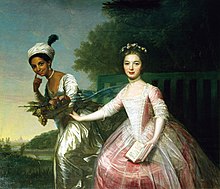
The year is 1769.
Britain is a colonial empire and a slave trading capital.
When I saw Belle on Netflix, I thought it looked like a rather interesting story. I don't see very many Period Dramas about those who do not have light skin.
Belle is about Dido Elizabeth Belle Lindsey, the biracial illegitimate daughter of a British naval officer and an African slave. Her father lost track of her until he found her again in the slums and took her home. She only really knew him for a few hours before he had to go back to sea, and he died out there before ever coming back.
Belle is full of themes about racial inequality, about how the colour of your skin, way back then, placed you in a class of respect no matter what your social class was. If you were white, you were fine. But if you were black, or even half-black, you were dirt. Because blacks were slaves.
But Dido wasn't a slave. Her father had money, he was wealthy, and she inherited it all when he passed away.
In the beginning, the Murrays and her new aunt were a little shocked and didn't know how to really go about this since Dido was the bi-product of an extremely sinful act and she wasn't white. But what I loved was that they grew to love her in a way that she was a member of the family.

I found it very interesting how Belle took place around the time of the Zong massacre - where a British captain and crew threw the entire quantity of slaves off the ship and let them drown because the drinking water was running low and the slaves were "diseased". The slaves were diseased because they were packed too closely together, and the ship passed by eight ports where they could have gotten water. According to history, the captain and crew did this in hopes of claiming insurance money on the slaves, which would amount to more than what they would have gotten for sick slaves. But thankfully, it was ruled that the insurance companies pay nothing to the Zong crew and it was thought to be one of the events that eventually lead to the outlawing of slavery all-together.
I'm also glad Dido didn't choose to marry the rich guy. His family was really only seeking after her money, anyway.
It was a relatively satisfying movie, and it helped remind me what society had to go through to get to where we are today.
The conversation that stuck with me...
William Murray (Dido's great-uncle): "This is not about Miss Lindsey."
John Davinier: "Of course it is! It's about all of us! ...It's about everything. ...Everything that's important!"
William Murray: "Mr. Davinier, ... the world is a devastating place. You must protect your emotions if you wish to prevent matters of law and...love from devastating you."

No comments:
Post a Comment